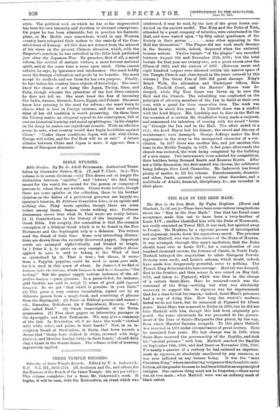BIBLE STUDIES.
Bible Studies. By Dr. G. Adolf Deissmann. Authorised Trans- lation by Alexander Grieve, MA. (T. and T. Clark. 9s.)—This volume is in seven divisions :—(1) This draws out at length the distinction between " epistles " and "letters," the first being meant for the world, the second for the person or company of persons to whom they are written. Cicero wrote letters, though there are some epistles in the collection, those to his brother Quintus on the duties of a provincial governor are largely so; Qnintus's treatise, Ds Petitione Consulatus Libor, is an epistle and nothing else. Pliny wrote epistles, though there are some letters among them; Seneca wrote nothing else. Professor Deissmann shows that what St. Paul wrote are really letters. (2. 3) Contributions to the history of the language of the Greek Bible. Put roughly, the contention is that the common conception of a Biblical Greek which is to be found in the New Testament and the Septuagint only is a delusion. The writers used the Greek of their time. Some very interesting illustra- tions are drawn from the recently discovered papyri. Important words are arranged alphabetically and treated at length. In 1 Peter ii. 2, to quote an easy example, the epithet &Some, applied to 7.:ixa is said to belong to the Word of God as symbolised by it. That is true ; but aSoAov, it seems from a Fayyfim papyrus, could be used to mean pure milk, for it is used in this sense of wheat. In James i. 3 we find lit awcipsov 6p.(411, Tes 7140-TEOJS, where Sorciplov is said to = Sorci.Leiov," the testing." But the papyri supply various instances of the ad- jective Seafteor = pure, genuine. In a pawn-ticket, for instance, gold buckles are said to weigh 7 mina3 of good gold (xinaroi; Stectafee). So we get "that which is genuine in your faith." (4) This gives a very curious incantation, copied out by an illiterate person from a magic-book, and consisting of phrases from the Septuagint. (5) Notes on Biblical persons and names— viz., Barnabas, Heliodorus (in 2 Maccabees), Manaen, "Saul, also called Paul." (6) Greek transcriptions of the Tetra- grammaton. (7) Five short papers on interesting passages in the Apocrypha and New Testament. We may give a summary of the last. In Revelation vii. 9 we have the words "clothed with white robes, and palms in their hands." Now, in an in- scription found at Stratonicea, in Carla, that town records a decree that "thirty boys clothed in white, crowned with twigs (Ocalto0, and likewise having twigs in their hands," should daily sing a hymn in the Senate-house. The volume is full of learning ingeniously applied.




















































 Previous page
Previous page